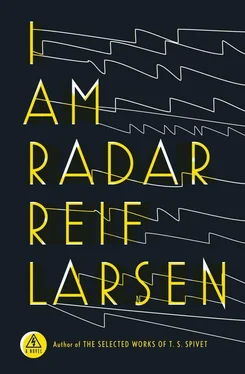In the final days of World War II, his younger sister Tura had also been born three weeks early. He and his parents had been fleeing the advancing Communist Partisans for the uncertain refuge of Slovenia and the West when she arrived suddenly, like a sneeze, in the mildewed basement of a Bosnian hotel on the River Sana. He remembered her tiny and pink in their mother’s arms, sheltered by a horsehair blanket while they rode in the back of a sputtering diesel truck past homes that burned and hissed against a light rain.
That is my sister in there, he thought, watching the blanket bounce to the staccato beat of the road’s potholes. She was born in the war, but she will not know the war. I will tell her how it was so that we will always have the same memories.
Tura would not have the same memories as he, nor any memories at all. On the second day, she opened her eyes to the light of this world, but she would not nurse, and so her body grew soft and light like a bird’s. One week later she was dead, from an illness that was never named. They buried her in an abandoned vineyard on the outskirts of Zagreb. After the impromptu ceremony, they were walking back to the truck when they discovered an unexploded German bomb lying only twenty meters from her grave.
“Her headstone,” his father, Dobroslav, had said, and it was not meant to be a joke, but they all began to laugh, and this felt good until their mother started to weep again. Two days later, she too would be dead, at a checkpoint near Ljubljana. Kermin was too young at the time to understand the particulars, but he knew it was because of something vaguely erotic — something wanted by the trigger-happy Russian private with the moth-eaten beard and something refused by his grieving mother, who was malnourished and weak but who was still and always would be a strong-willed Radmanovic woman. His father had just turned from successfully negotiating their passage with the squat colonel, but it was too late; the young Russian guard had already shot her twice through the chest. It was as if the man had meant to push her backwards with the palm of his hand but had simply used the wrong tool. He began to walk quickly away from the scene so his comrades would not see the terror in his eyes. Instead of falling to the ground like a heavy doll, as Kermin had seen the prisoners do at the Chetnik executions, his mother shrank into herself, a reverse blossoming, coming to rest in a sitting position, like a ruminative Buddha. She was already stiff by the time her husband reached her. He sat down beside her and held her hands as though they were quietly praying together. Later, the colonel apologized to his father and promised that the young guard would be executed before the day was through.
Years later, even after he had fled Europe, Kermin’s limited sexual encounters — in a Meadowlands parking lot; in a Saigon bordello; behind the vestry of St. Sava’s; in the synthetic floral bloom of his dentist’s bathroom — these moments of carnal urgency were still inflected with the lingering sense of crossing a hostile border. Until he had met Charlene, his relationships had not gone well.
In the darkness of birthing room 4C, Kermin tried to hold his pocket light steady on his wife and brand-new baby. All will be fine, he whispered to himself, there is no reason to worry. His own birth had been famously quick and painless. His mother had claimed he leaped out into the world the first chance he got, as if he could not breathe inside her. “I was killing you!” she used to say. Maybe his child would be no different. Kakav otac takav sin. Like father, like son.
But even then he could tell something was not right. Under the pocket light’s dull beam, the child appeared almost prehistoric. The newborn’s skin was covered in a white, gooey plaster, as if he were not a baby but a statue mold of a baby — a golem, complete with tiny plaster penis. Kermin stared. He wanted to press his hand into this creature’s clay skin, to test its warmth, but already here were the first signs of life: the statue-child was squirming, clawing for oxygen, expelling the first sticky mew of a cry, his tiny mouth working the air for the solidity of a nipple.
“Why is he like this?” Kermin whispered, his pocket light inadvertently dipping before he righted its beam again. “Why does he look like this?”
Charlene, completely exhausted but wild with muddied adrenaline, tasted the concern in her husband’s voice. She tried to sit up.
“What is it? What’s wrong? He’s a boy? Is he okay?” The words swung and gimballed.
“Don’t worry, don’t worry. He’s fine,” Dr. Sherman reassured her, gathering the baby and all of his limbs into a pastel blanket. Instinctively, he took the bright white plastic clamp from the tray and snapped it closed at the base of the umbilical cord. “Preterms are often covered in a substance called vernix caseosa. This protects their skin. It will come right off.” In truth, he had never quite seen such a thick vernix coating, but then there had been nothing normal about this night, so he tried not to let his concern reveal itself in the contours of his words.
Charlene’s green eyes burned in the light.
“I want him with me. .” she said.
“You will have him, don’t you worry,” said the nurse. “You’ll have him for the rest of your life.”
Before Charlene could process the ominous undercurrent of this statement, the nurse put a hand on her shoulder and gently eased her backwards onto the bed. She smoothed a wet curl of black hair across Charlene’s forehead and then adjusted the flow of her IV, opening the secondary port to allow an influx of opioids. Charlene let out a quiet groan and slumped back into the darkness.
“Do we have battery power on the suction?” Dr. Sherman asked.
The nurse checked the machine. “No, doctor,” she said.
“That’s all right. I’ll do it myself.”
He took a wet cloth and carefully wiped off the child’s mouth and face and then his left arm. The thick layer of vernix came away easily. “You see?” he said to Kermin, but Kermin did not answer. He was holding his pocket light, staring at his son. Where the doctor had wiped away the globular coating, the child’s skin appeared very dark — so dark it shimmered purple in the beam of light, like an eggplant. Dr. Sherman looked down and caught his breath. He wiped away more of the white substance. The jet-black umbra of the skin beneath the bright vernix was disarming, as if beneath his covering the child was made only of more shadows.
“He is okay?” Kermin was asking from behind. “He looks. .” There was not a word for this. And now the first full-force wail from the infant, announcing his own arrival.
“Doctor, should we do an Apgar test?” the nurse asked. The doctor hesitated, mystified, holding the baby up to the beam of light. The body squirmed, half white, half black — a negative image of itself. There was a chance this was all still a dream, though the pain in his oblique muscles told him otherwise. He had lived long enough to know that pain never appears in dreams.
From somewhere down the hall came the sound of urgent shouting.
Dr. Sherman snapped back to life. “It’s a boy!” he said, flushing out the obvious. He busied himself with wiping away the rest of the vernix and then snipped the umbilical cord with a precision that calmed his nerves.
“I’ll get an Apgar. Can we get some more lamps in here?” He was enjoying speaking aloud. The act of speaking was making this world possible again. “And what the hell happened with the electric? Can someone find out? You would think with all of this modern technology. .”
“Can I have him?” Charlene said from the darkness.
“We just want to run a few tests to make sure—” Dr. Sherman was in the process of handing the baby off to the nurse when a deep, mechanical moan rose up from somewhere in the building. The central air system shuddered and the ducts began to exhale above their heads and then all of the lights in the room sputtered on, one by one.
Читать дальше












